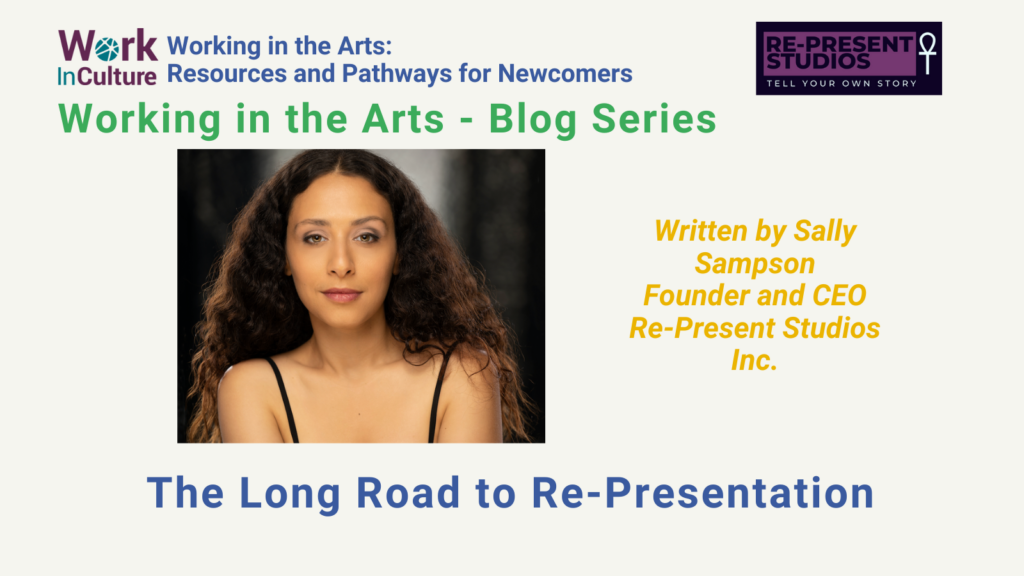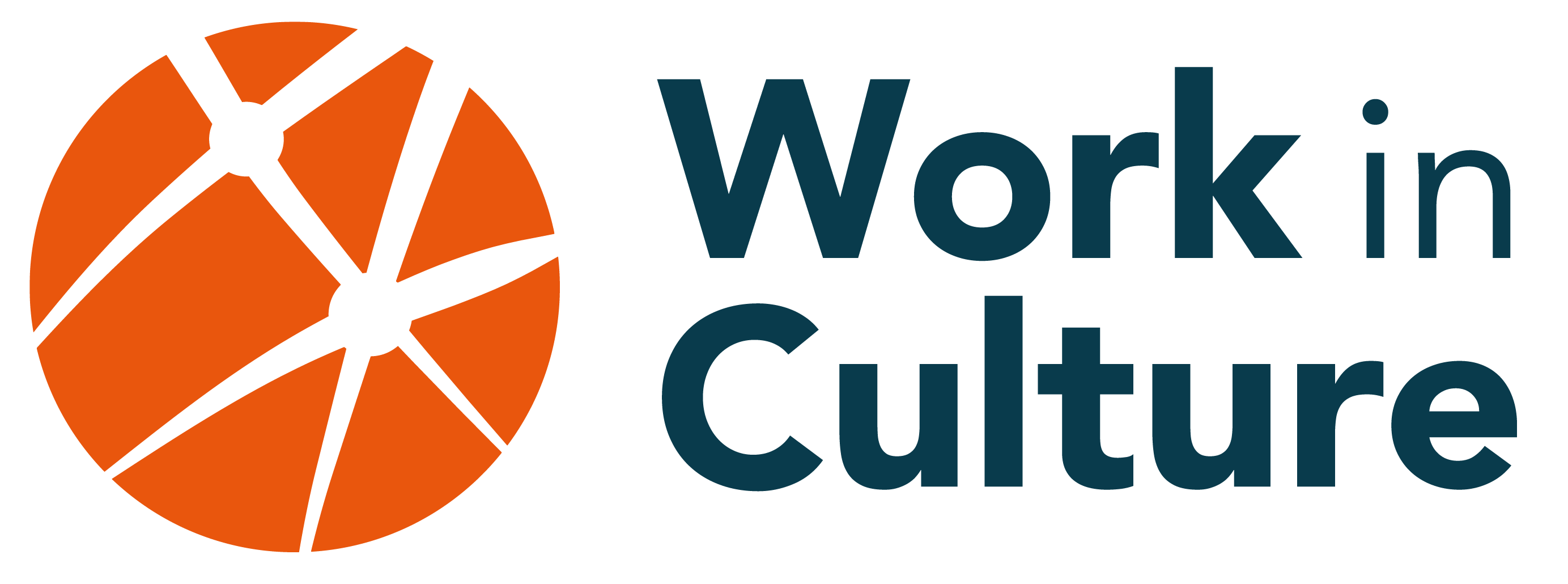
A Working in the Arts blog series by Sally Sampson
This blog is part of the Working in the Arts blog series. Working in the Arts is a new program from Work in Culture that aims to help streamline the pathway to careers in the arts for newcomer and immigrant artists and arts professionals. Working in the Arts was developed in partnership with Airsa, the Immigrant Writers Association, the Institute for Creative Exchange, Paralia Newcomer Arts Network and the Toronto Region Immigrant Employment Council, and made possible with support from the Canada Council for the Arts.
Who is Sally Sampson?
Sally Sampson is the Founder and CEO of Re-Present Studios, a company that trains and empowers performers from predominantly underrepresented and marginalized groups to reclaim their identities and tell their own stories.
Having lived in various parts of the world from Bahrain to Oman to the UK, Sally’s multicultural experiences have deeply influenced her perspectives. Her diverse background not only enriches her work as an artist, but also drives her vision for Re-Present Studios. Determined to be a catalyst for change, Sally is committed to ensuring every artist has a platform to share their authentic voice and she’s eager to foster collaboration and bridge cultural gaps in the Canadian arts scene and beyond.
The Long Road to Re-Presentation
by Sally Sampson
Setting the Stage
I was ten years old when I first became aware of how wholly hypnotized and obsessed with the performing arts I was. There was, and still is, nothing quite like the power of story. The narratives, the characters, the adventures I became engrossed in, took me on a rollercoaster of emotions and experiences and infected me with their magic. And even as a wide-eyed, big-haired pre-adolescent, I knew — I just knew — that there was no other profession in the world that I wanted to be a part of. And so, it was no surprise to anyone when a decade or so later, I began my professional career as a performer and, with all the naivete and bravado one little girl could muster, I entered the arts industry fully determined to “make it.”
Fifteen years later, I look back at that bright-eyed, twenty-something year old girl and I just think, “Girl, you had no clue did you?”
Sure, I had boundless passion, but I really didn’t have any idea what I was doing — just like every artist probably doesn’t either. The common artist’s journey goes a little something like this: you get some training, get an agent, go to a relentless stream of auditions in the hopes of landing the gig of a lifetime, get some work but not enough to pay your bills, get a “day job” to sustain yourself, go to more auditions — rinse and repeat multiplied by infinity.
Let’s face it: no one has a map or a GPS system to help them navigate this industry. It’s the Bermuda Triangle of industries. Some people make it to the other side, but they don’t often know how they got there either! For the majority of artists, however, the entertainment industry swallows them whole, overwhelms them and after varying time periods, makes them abandon ship and wave their little white flag of surrender.
Needless to say, this can be demotivating — but what it really is, is soul crushing.
While this is the average journey of the performer in general, if you also happen to be part of one or several underrepresented and/or marginalized groups of people (i.e., BIPOC, LGBTQ+, Women, People With Disabilities), it is even more of a no man’s land, because you have seen few, if any, authentic examples of people who share your identity along the way. As a result, venturing into the arts becomes a greater act of faith and courage.
I personally identify as an Egyptian/Canadian cis-woman. In the auditions and roles that I have gone up for, over the past fifteen years of being a performer, my culture has consistently been either absent from mainstream media or confined to clichés and stereotypes. I have been cast as a woman in a Burqa, been asked to sound “more Arab” and told that I could probably pass as a Southeast Asian if I wanted to expand my options.
This experience is not just specific to Arabs. I know for a fact that many from a myriad of underrepresented and misrepresented backgrounds can relate.
Steps Towards Empowerment
Conversations with many performers from a wide spectrum of backgrounds over the years, in tandem with my own experiences and encounters with the entertainment industry, have left me with a few key conclusions:
- Most performers who opt to stay in the business after years of things “not going to plan,” have an impressively high tolerance and resilience against rejection. They are simultaneously some of the most hopeful people you will ever come across.
- Most performers who resiliently stay in the business, despite feeling rejected, have a deep and unreasonable love for the creative and artistic process.
- Most performers feel incredibly helpless, stuck and disempowered within the arts and entertainment industry.
Like I said, it’s the Bermuda Triangle.
The question that has pestered, prodded and provoked me for many years has been: What would it mean for artists, particularly those from underrepresented groups, to feel like they had choices and a measure of control over the direction of their careers?
The answer? Everything! A measure of control over your life is the difference between feeling disempowered and empowered, and so, the challenge for me has been finding a way to help performers go from a state of disempowerment to empowerment and to break the paradigm by putting them in the driver’s seat.
Launching Re-Present Studios — Tell Your Own Story
To provide a clear and actionable roadmap to this empowerment, at the beginning of 2023, I dedicated myself to launching Re-Present Studios.
Re-Present Studios is a company with a core mission to educate, empower and therefore emancipate performers, predominantly from underrepresented and marginalized communities, who have had stories from their cultures & subcultures denied, reduced, altered, or simply told by someone else. Our mantra therefore is “Tell Your Own Story” and we work to empower performers to reclaim their power and narratives.
Through Re-Present Studios, we advocate for performers to become highly skilled at their crafts, all the while staying true to their authentic identities. Artistry alone, however, is not enough! The entertainment industry demands visibility, especially from performers seeking a sustainable career in the arts. After all, there are plenty of talented performers that no one knows about. That’s why at Re-Present Studios, our commitment is twofold. We’re dedicated to making sure our students are skilled in their crafts, but we also emphasize the importance of being business-savvy and having an entrepreneurial mindset. We are committed to ensuring that performers are exceptional at both of those things, because effectively challenging inequity from the grassroots level demands excellence and resourcefulness working together and not in isolation.
It’s also for this reason that Re-Present Studios proudly operates as a for-profit organization. This intentional and strategic choice stems from my personal commitment to challenge the notions of scarcity around the arts and push back against the belief that artists should not be highly-compensated for their services. There are many incredible non-profit organizations that help artists and provide them with resources to navigate their careers, but this is not the only way to do it.
At Re-Present Studios, we aim to adapt and innovate without constraint and equip our artists with cutting-edge resources, free from the potential boundaries often linked with cash-flow setbacks. We proudly operate using this framework, because this is the framework we teach to empower our artists also in their own individual careers moving forward.
Work To Be Done
Today, even with the overall push towards more diversity, inclusion and empowerment across every sector in society, it must be said that we must not spend too much time congratulating ourselves for the small steps taken, because there is still a very long way to go and a plethora of blind spots that still need to be addressed.
There remains a fair share of tokenism, parading as diversity all across the arts, where we visually see multiculturalism showcased, but no real change to the stories and narratives being crafted has occurred. There is still a lack of representation behind-the-scenes in boardrooms and in decision-making roles. Performers remain stuck in scarcity waiting for someone out there to give them a shot, rather than realizing that an understanding of business is everything they need to live the full-time creative life they crave. These are just some of the issues that require attention.
This is not a lament nor an attack on strides already taken in the right direction — but it is a challenge to highlight opportunities where we can start a dialogue and do better. This can only happen if we are brave enough to critique the status quo and call a spade a spade — even if that makes some people uncomfortable.
Despite roadblocks and frustrations, when I started Re-Present Studios, I chose to found it on the faith that it is possible for things to change for the better. There should always be room for everyone to tell their own stories and I truly believe that, as artists, we can have more agency over our lives than we’ve been led to believe. We just need some guidance and a map to go by — and that’s exactly what Re-Present Studios, in partnership with Work in Culture and other like-minded organizations, is striving to do.
If you are a performer from an underrepresented/marginalized group and have any questions or would like to inquire further about performance and entrepreneurial training opportunities at Re-Present Studios, feel free to email [email protected].
This is the first blog from a series of three blogs. Stay tuned as we release the next two blogs in the upcoming months as a part of the Working in the Arts blog series written by Sally Sampson.
Learn more about Working in the Arts and the resources created throughout this program at workinculture.ca/programs/working-in-the-arts-newcomers.
